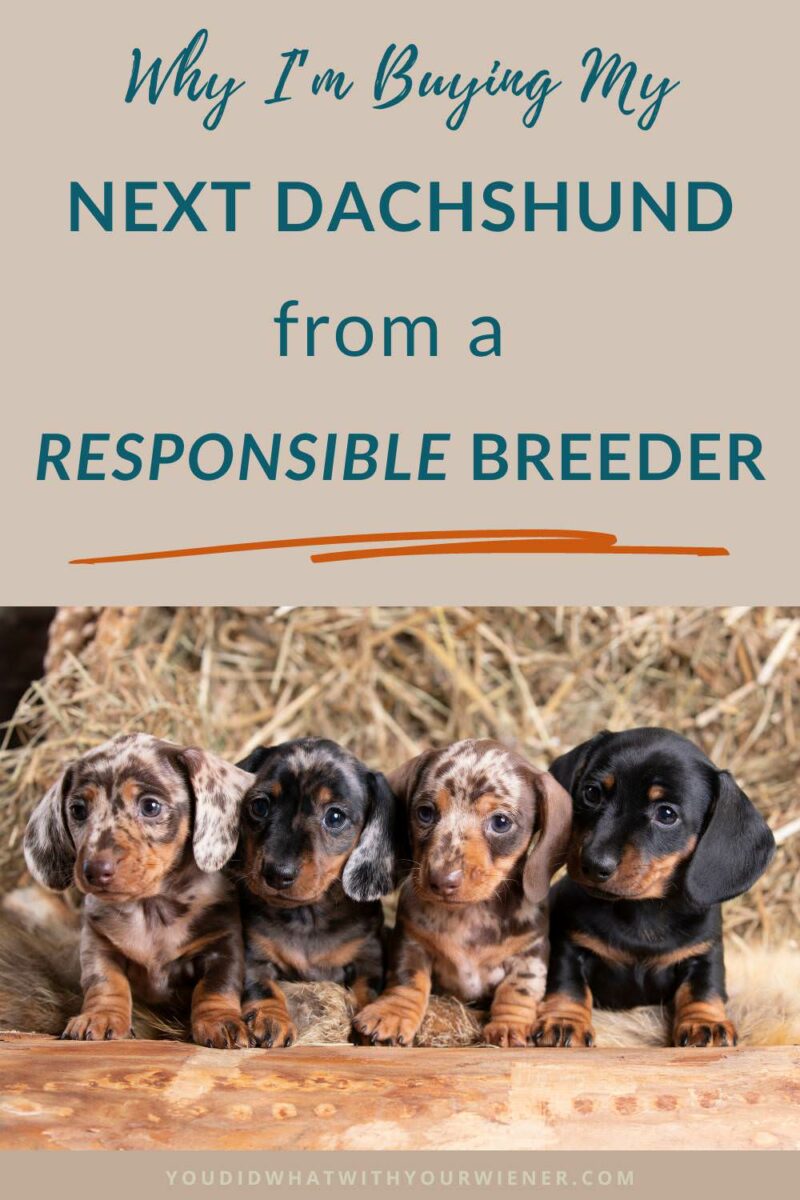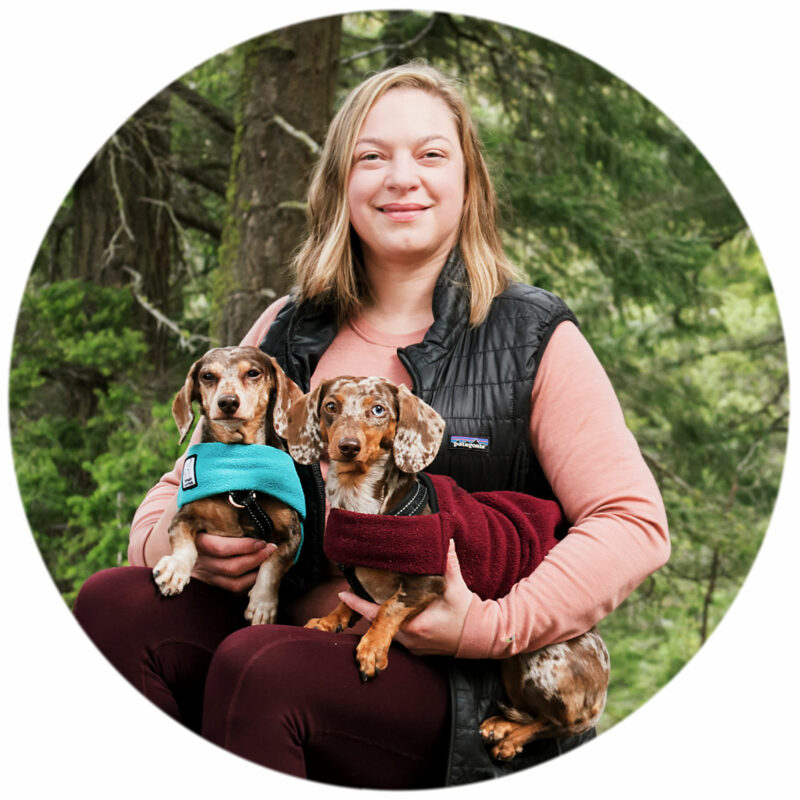Why I’m Buying My Next Dachshund from a Responsible Breeder
Last week, I posted an update about getting a third Dachshund on Facebook.
Some people voiced their disappointment that I am getting a puppy from a breeder this time around versus rescuing.
I understand the controversy around breeder vs rescue very well, so I was not surprised.

Of course, at least one person tried to shame me and implied that I am killing a shelter dog if I don’t adopt.
It’s a fact that there are dogs in shelters that are being euthanized.
However, there are so many reasons that dogs die in shelters, the least of which is someone buying a puppy from a responsible breeder.
The bottom line is, no, I’m not dooming a shelter dog because I am buying a puppy.
7 Reasons Why Getting a Puppy from a Breeder is the Right Choice for Me
I’m very confident in my decision to buy a puppy from a responsible breeder and don’t think I need to make excuses.
In the interest of transparency, I will share a little about why I made this decision though.
Just keep in mind: I’m not putting this out there because I am interested in arguing about or debating my choice.
It’s not a decision I arrived at lightly.
1) To potentially reduce the risk of back injury
Intervertebral Disk Disease (IVDD), the primary cause of disk ruptures in Dachshunds, is a genetic disease.
It’s said to be “fixed” for the Dachshund breed, meaning that almost all Dachshunds have at least 1 copy of the gene that causes it.
However, some other countries are way ahead of the US when it comes to reducing the risk of disk ruptures within the breed.
In countries like Denmark and Finland, breeders regularly back screen the spines of the potential Mom and Dad and only breed together a pair with lower risk.
While no one believes this is an absolute guarantee against back injuries, when done for generations in a breeding program, it can reduce the risk of a Dachshund becoming paralyzed or needing expensive surgery later in life.
Because of our active lifestyle, it’s important to reduce the possibility of IVDD as much as possible.
2) I currently have the time and am 100% dedicated to raising a puppy right
Raising a puppy is hard work. Like really hard.
Like so hard I asked myself if I ever wanted to do it again during those first 6 months with my last puppy (which was my first puppy-raising experience).
The puppy blues are real!
Did you know that puppies need almost 24-7 attention and supervision for the first 2-3 weeks minimum?
This is important to provide emotional comfort so that behavior issues can be avoided in the future.
It’s also important to ensure proper potty breaks and training from the beginning.
With a traditional 9-5 job, that means one will need to save up all their paid vacation for a year and spend it at home with their new puppy.
A spouse may even need to do the same and take their two-week vacation after your two weeks is up.
Today, I work from home running my own business, so I have the ultimate flexibility to be able to focus on a puppy’s care, wellbeing, and raising.
In general, the health and care of my Dachshunds is my primary purpose in life, but right now I have the time to 100% dedicate myself to raising a healthy, calm, well-adjusted Dachshund puppy.
My situation may change in the future, and I have no plans to try raising a puppy while punching the clock full-time for someone else, so now is the time to do it for me.
3) To improve my Dachshund training skills (so someday I can become a trainer)
It’s no secret that I barely trained my first Dachshund. He was so happy and “chill” that I didn’t need to.
Then I adopted Gretel, who was such an anxious mess she was on Prozac. Her reactivity was over the top.
I had to learn a lot about helping a very reactive dog through management, confidence building, and desensitization training.
Making her feel more comfortable when out in the world so we could travel was my #1 goal so I wasn’t able to put effort into stuff like obedience and tricks.
Then I got my first Dachshund puppy – Summit – and I was sure I was going to be the best trainer and have the best trained Dachshund.
But then it got hard, confusing, and frustrating.
I had to scale back my vision of how well she would be trained, how fast I was going to train her, and my idea of perfection.
But I learned a lot about dog training. I was finally able to put all I had learned about dog behavior and body language to work.
Somewhere during the first 5 years with her, while I repeatedly exclaimed things like, “I’m not a dog trainer” or “I’m not interested in dog training”, I became honestly interested in dog training.
It’s funny how that works.
Today, I entertain the thought of one day becoming a Dachshund trainer so I can help other people live easier lives with their Dachshunds and so they are less likely to be rehomed.
But I’m still very much a beginner.
I am capable of teaching a dog basic skills and helping to shape their future behavior from a “blank slate” puppy stage.
I think those skills are a great foundation for any dog trainer and starting with “less of a challenge” will help build my confidence.
I want another round of “what I did with my last puppy but better” before I move onto trying to change the behavior of older dogs, especially ones with significant behavioral issues.
While it is true that a new-to-you older dog will need some training, that training is usually targeted and focused on “fixing” the things that are not already the way you want or need them to be.
Raising a puppy is the “big picture” of training because you are required to train all the things.
4) Overall health is tied to genetics
This was a minor factor in my decision but still one worth mentioning.
While I recognize that any dog can have significant health issues no matter where they come from – rescue, backyard breeder, reputable breeder, etc. – it is a fact that a Dachshund with “good genes” is less likely to experience certain health issues.
For example, a significant factor in a Dachshund’s dental health is genetics.
I’ve seen it and several veterinarians have pointed it out to me over the years.
Poorly bred dogs can be plagued with dental issues throughout their lives despite the best oral hygiene routine.
Conversely, a Dachshund that receives little or no dental care over their lifetime may experience low plaque buildup or a low incidence of tooth issues.
Many cancers are also linked to genetics.
Getting a Dachshund from a breeder that knows the health and history of their breeding lines can help reduce the possibility of costly – both emotionally and financially – genetic diseases and illnesses.
5) Costs are more predictable with a puppy
I want to call out medical costs separately from the above back issues and genetic illnesses.
The reason is that I have to consider there is a senior dog entering her “geriactric” stage of life in my home.
My senior Dachshund, Gretel, has really started showing her age this past year. It’s clear to me that her medical costs will likely start increasing.
In addition, I have to consider my second Dachshund, Summit.
While she is generally very healthy, she is just now entering the “window” when she is more likely to suffer an IVDD-related back injury.
Treatment for back issues can cost $3,000-$12,000, depending on what type of treatment is required and for how long.
Dachshund back surgery is almost certainly in the $10,000 range.
I know it’s not a guarantee, but getting a young, well-bred Dachshund from a high-quality breeder may minimize any “surprise” medical costs for at least the first few years.
I am not saying puppies are cheap to buy or raise – they are most certainly not – but the incurred costs are typically predictable, potentially leaving more funds available for Gretel’s urgent needs or Summit if she is diagnosed with IVDD.
6) The opportunity to shape an adventure dog
We live a very active lifestyle, which involves a lot of travel and going out in public.
Each time I get a new dog, I worry that they won’t fit into our adventure lifestyle.
Although all dogs are born with an inherent personality, and they can develop behavioral issues early on with their siblings and parents, it’s less likely.
It’s much easier to correct any behavior issues when they are young before it is an ingrained habit.
It’s important for me to have a predictable dog that I have personally shaped to fit our lifestyle through training and routine so that I can take her out into public without stress or risk to others.
7) An easier senior dog to puppy introduction
While my Dachshunds are used to a rotating cast of house mates due to my dog sitting side gig, they typically aren’t that into them.
Gretel is rarely interested in playing or engaging with them – even the young ones.
I in no way expect it to happen’ but you’ve probably all heard someone say, “My senior dog became playful again after bringing a puppy home”.
While I don’t expect this to happen with Gretel, I admit I am hopeful.
At the very least, while not the case all the time, it’s generally easier to integrate a puppy into a household with an elderly dog.
Dogs inherently know that puppies don’t know their manners yet, so if the puppy oversteps boundaries, it’s less likely to upset or traumatize the older dog.
Who Is My Breeder of Choice?
I’ve literally looked all over the world for a good Dachshund breeder.
The responsible breeder that I will be buying my puppy from:
- Breeds with health, structure, and temperament foremost in her mind vs trendy, unhealthy caricatures of the breed.
- Thoroughly health tests all her potential parent dogs for defects of the spine (IVDC, block vetebra, hemivertebra, transitional vertebra, spondylosis deformans), eyes (35+ defects), kneecap (patellar luxation), and heart.
- Has tested 5 generations of Dachshunds for these illnesses and disorders
- Goes over the care of the puppy with the new owners and provides a PDF with detailed care information including the suggested vaccination schedule
- Has written several books on Dachshund genetics (Wienepedia series) – one for IVDD and several on the genetics of colors and patterns.
The part that is most unique, and which I am most excited about, I is that back screening is part of her breeding program.
Back screening is something primarily done in Finland and Denmark as a way to, hopefully, reduce the risk of IVDD disk ruptures over generations.
This breeder is spearheading an international study on environmental factors that may influence IVDD (supplements, specifically, from what I understand).
While I am not revealing the name of this breeder at this time because it’s not an absolute certainty I will get a puppy from her this year, I will if and when we select one.
Final Thoughts
My hope is that we will be welcoming a new bundle of joy home by the end of 2023.
While I made the decision to buy a puppy from a reputable breeder at this moment, I have adopted in the past and helped rescue animals.
- I’ve adopted two Dachshunds so far.
- I’ve donated hours and hours my time and expertise to help rescues with their marketing.
- I’ve donated money to rescues and nonprofits that help Dachshunds.
- I’ve helped coach people in our Dachshund Club that may be considering surrendering their dog to a rescue (so they are more likely to keep them) to help with training, behavioral, and health issues.
- Through my blog (over 100,000 people read my blog every month), I educate people considering getting a Dachshund about the challenges of the breed and how to care for them properly. My hope in doing so is that fewer families will change their mind and surrender the dog to a shelter/rescue.
- Growing up, my family adopted 5 different rescue dogs and we owned 10 different rescue cats (some of which we found half dead and rehabilitated).
So no one can say that I haven’t done my part for rescue throughout my life.
Buying a puppy from a reputable breeder at this time does not negate what I have done in the past or mean that I won’t adopt a Dachshund in the future.
In fact, I am sure that I will.


About the Author
Hi, I’m Jessica. I’ve been studying the Dachshund breed since 2007, owned 3 of my own, and shared in the lives of thousands of others through their owner’s stories. When I’m not sharing what I know on this blog, you can find me hiking, camping, and traveling with my adventurous wiener dogs.

I’d like to know the supplements you recommend please?
Iam very interested in getting my girls ( 5) and (15 almost 16) the best supplements.
They eat dry food high quality hopefully. Xoxo
Hi Olivia. You can read about the supplements I give my Dachshunds here: https://youdidwhatwithyourweiner.com/supplements-active-senior-dogs-and-dogs-recovering-from-ivdd/
Dachshunds are my favorite breed, I really love them, they are so cute! But I didn’t know about the risk of spinal injury they might have. I think that finnish and danish program of regular back screening is such a cool way of preventing getting injured or paralyzed later in life. Health of both people and dogs is important, so I think you need to be sure about how your dog was doing before you adopted him to prevent unnessesary expenses and minimize any surprising medical costs you will have to pay for. So yeah, while choosing a dog, think thoroughly.